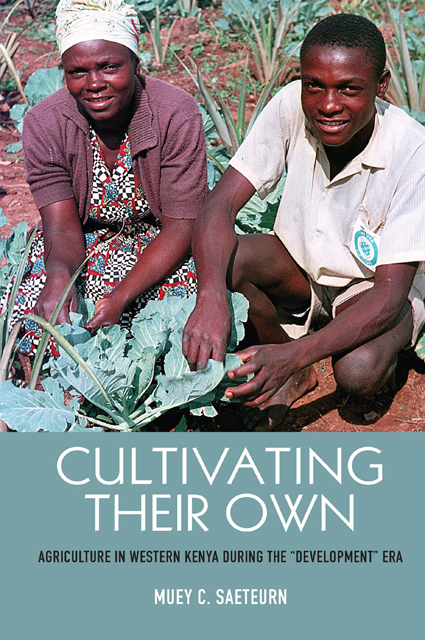Book contents
- Frontmatter
- Dedication
- Contents
- Acknowledgments
- Acronyms and Abbreviations
- Maps
- Introduction
- 1 The Role of Agriculture in Kenya’s Political Economy in the Era of Transition and Independence
- 2 Western Kenya’s Region, People, and the Origins of Population Density
- 3 Chavakali Secondary School: A Place of Learning and Farming
- 4 “Doing Their Part”: 4-K Farmers’ Clubs
- 5 Friends and Acres: The Friends Africa Mission Stewardship Program
- 6 “Home is Home”: The Lugari Settlement Scheme and Maragoliland
- Conclusion: Agricultural Production—The New (Old) Sexy
- Appendix: Interviewee Information
- Notes
- Bibliography
- Index
5 - Friends and Acres: The Friends Africa Mission Stewardship Program
Published online by Cambridge University Press: 18 January 2023
- Frontmatter
- Dedication
- Contents
- Acknowledgments
- Acronyms and Abbreviations
- Maps
- Introduction
- 1 The Role of Agriculture in Kenya’s Political Economy in the Era of Transition and Independence
- 2 Western Kenya’s Region, People, and the Origins of Population Density
- 3 Chavakali Secondary School: A Place of Learning and Farming
- 4 “Doing Their Part”: 4-K Farmers’ Clubs
- 5 Friends and Acres: The Friends Africa Mission Stewardship Program
- 6 “Home is Home”: The Lugari Settlement Scheme and Maragoliland
- Conclusion: Agricultural Production—The New (Old) Sexy
- Appendix: Interviewee Information
- Notes
- Bibliography
- Index
Summary
In May 1962, Rodney Morris, an agricultural missionary with the Friends Africa Mission (FAM), wrote to the local leadership of the East Africa Yearly Meeting (EAYM) to explain the exact nature of the relationship between EAYM and the World Neighbors Organization, an American non-governmental aid institution. In so doing, Morris hoped that he would be able to attend to some concerns that the local EAYM leaders had about this new partnership that commenced in April of that year. Namely, Morris’s memo addressed the Kenyan Quaker leaders’ “widespread interest” over what the partnership would mean for themselves and their congregation within the context of decolonization and, more importantly, how it would impact EAYM’s final phase of transition.
In his memo, Morris revealed that World Neighbors would provide funding to expand a program that he was heading—the Stewardship Rural Service Program. This program was an agricultural and village development initiative aimed at helping the local Christian community in western Kenya “gain the various skills necessary for them to contribute to and share in the economic and social development of their communities.” The partnership with World Neighbors was to enable Morris to bring the Stewardship Program to some 400 village meetings (churches) in western Kenya’s Elgon and North Nyanza regions. Both regions were located in Kenya’s most densely populated areas with some locations, like Maragoliland, holding over one thousand people per square mile.
Though the goals of the Stewardship Program were clear, Morris assured the Yearly Meeting leaders that the financial assistance from World Neighbors would support initiatives that local church officials, himself included, deemed useful. Specifically, he stressed that the funds would help him carry out his agricultural ministry, which was centered on “modernizing” local Quaker farmers. His work was of the utmost importance, Morris maintained, because “modern” (and productive) farmers would be able to contribute to the local meetings and thereby help expedite EAYM’s transition into a financially and locally-operated independent church. “East Africa Yearly Meeting will stand or fall according to the strength and dedication of individual village meetings,” warned Morris, “in the same way the new free Kenya must rely on the small villages and people who earn their living from the land.”
- Type
- Chapter
- Information
- Cultivating their OwnAgriculture in Western Kenya during the 'Development' Era, pp. 99 - 125Publisher: Boydell & BrewerPrint publication year: 2020



